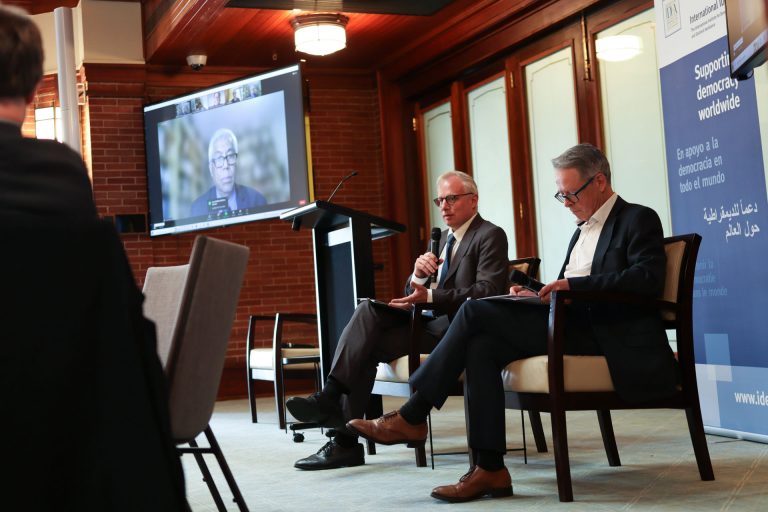Australian academic Sean Turnell was released from prison in Myanmar on 17 November as part of an amnesty for the National Day of Myanmar. He had been sentenced to three years for violation of the Official Secrets Act. Turnell describes being placed in a filthy cell and hearing prisoners being tortured in rooms nearby. He spent 650 days incarcerated in nightmarish conditions and is now safely back with his family in Sydney.
Myanmar Campaign Network (MCN) welcomes the release of Sean Turnell and other prisoners in the amnesty, including former British Ambassador to Myanmar, Vicki Bowman, her husband Htein Linn, Japanese filmmaker Toru Kubota and and American botanist Kyaw Htay Oo. Although the junta announced they would release 5,774 prisoners, Assistance Association for Political Prisoners has verified that only 161 political prisoners have been released so far while nearly 13,000 people arbitrarily arrested since the coup remain in prison.
Myanmar Campaign Manager Tasneem Roc said: “We view this amnesty as a tactic, as the military regime attempts to legitimise itself in the eyes of the international community, while it continues to commit atrocity crimes.”
Attack on school shows need for sanctions
The Myanmar military persists in its widespread, systematic attacks on civilians, including the shocking September attack on a school in the Sagaing region by Russian-manufactured Mi-35 helicopter gunships which left at least six children dead.
The regime does not manufacture heavy artillery, jets, attack helicopters or aviation fuel and relies on the flow of foreign revenue from its vast business network to purchase arms from Russia, China, Serbia and other countries.
The mining and oil and gas industries continue to funnel billions into Myanmar’s state-owned enterprises, whose bank accounts are under military control since last year’s coup.
Minister for Foreign Affairs Penny Wong had repeatedly stated that the release of Professor Turnell was Australia’s “first priority” in Myanmar and that sanctions are under “active consideration”. Now Professor Turnell has been released MCN calls for Australia to immediately impose targeted sanctions on Myanmar military, its business network, state-owned enterprises and its associates. Sanctions will cut access to foreign revenue and limit the regime’s ability to purchase weapons. Travel bans and visa bans on the regime’s leadership and their immediate families should be part of sanctions, to hold the perpetrators of war crimes and crimes against humanity to account.
Since the federal election in May, MCN has written to Minister Wong signed by 122 Australian and international organisations calling for targeted sanctions. Ten Victorian state parliamentarians have also written to Minister Wong stating their support for targeted sanctions. MCN has briefed independent MP Zoe Daniel, who recently lodged a Notice of Motion on targeted sanctions after the military launched a deliberate air strike on a music festival in Kachin State last month that killed up to 80 people.
Human rights expert Chris Sidioti said: “There’s no more excuse now, we can no longer hide behind Sean’s imprisonment, it’s time for action on the part of the Australian government, and that means sanctions. Sanctions against the top military leadership, and even more importantly against their business enterprises.”
Since his return to Australia, Professor Turnell has called for Australia to introduce sanctions against the junta (embed the article).
At the World Congress of the International Trade Union Confederation (ITUC) in Melbourne last week, Ms Khaing Zar Aung, Executive member of the Confederation of Trade Unions, Myanmar (CTUM), called for comprehensive sanctions against the Myanmar junta.
Myanmar Roadmap to Federal Democracy Forum

Dr Marcus Brand International IDEA and Professor Mark Kenny from Australian National University address the room.
As the junta pushes towards its sham elections next year, MCN investigated how the international community can support a transition to a federal democracy based on human rights and rule of law.
The Myanmar Roadmap to Federal Democracy Forum was held on 29 September, co-hosted by the National Unity Government of Myanmar (NUG), Myanmar Campaign Network (MCN), and the International Institute for Democracy and Electoral Assistance (International IDEA), and the forum covered:
- Interim Institutions
- The Federal Democracy Charter
- Transitional Justice
- Negotiating a new federal constitution
- Establishing a new justice system
Australia can nurture the democratisation process by providing cross-border humanitarian aid, technical and financial assistance and importantly, recognition to the legitimate government, the National Unity Government.